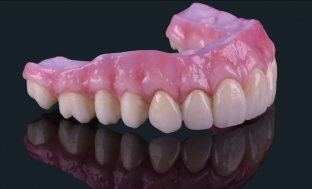The absence of one or more teeth in modern dentistry is a problem that is solved quickly and efficiently. For this, different types of prosthetics are used. The choice of prostheses is approached individually and seriously, taking into account all the pros and cons of different types of prostheses. Removable nylon dentures are very popular. What are nylon dentures? What are their advantages and disadvantages? How to care for such prostheses, read our article.
What are nylon dentures? When is it recommended to install them?
Nylon prostheses differ from other prostheses in their flexibility and softness, and they become so when they are in the mouth. When the prosthesis warms up to body temperature, it becomes less resistant to severe chewing loads. It is important to note that nylon dentures do not always contribute to the chewing function to the extent of their softness. Flexibility and softness make nylon dentures comfortable to use, the tissues of the oral cavity quickly get used to such dentures due to their softness and lightness.
The aesthetic appearance of nylon dentures matches the natural appearance of teeth and oral tissues. This appearance is maintained for the entire period of wearing.
Indications for nylon dentures:
- Slight defects in the dentition (missing several teeth).
- Presence of almost toothless gums.
- The presence of periodontal disease of the second degree.
- Early loss of teeth, the presence of dangerous professions in patients.
Advantages and disadvantages of nylon dentures
There are several advantages of nylon dentures that have made them popular in dentistry.
Benefits of nylon dentures:
- Hypoallergenic. Nylon prostheses have good biocompatibility. If the patient is allergic to acrylic or metal, nylon dentures are a good choice.
- To install the prosthesis does not require grinding of teeth.
- Nylon dentures are good because they can be placed on teeth affected by periodontitis.
- The abutment teeth on which the prosthesis is attached can not be covered with crowns, which is an indisputable advantage.
- The fixation of the prosthesis is quite reliable, and there is no need to additionally fix the prosthesis with special gels or creams.
- The softness and flexibility of nylon extends the life of the denture.
Disadvantages of nylon dentures:
- The possibility of translucence through the base of the prosthesis at the junction.
- There is a possibility of bone atrophy due to the elasticity and flexibility of the prosthesis. In this case, the prostheses rub the skin of the mucous membrane in the region of the lateral teeth, there is a risk of injury to the gum tissue.
- Increased risk of denture pigment changes.
- Nylon dentures are very easily damaged by scratches. Therefore, dentures require special attention and care.
Nylon dentures are not cleaned with regular toothpastes to avoid scratches. If the prosthesis is damaged, nylon absorbs foreign odors and color, keeping them for a long time.

What kind of care is required for nylon dentures?
Nylon manufacturers claim that nylon is non-toxic, does not absorb moisture and does not emit odors. Prosthesis care consists in rinsing the mouth with boiled or filtered water. If possible, you need to remove the prosthesis to clean it and treat it with a special solution or a soft toothbrush. To prevent damage to the nylon, conventional toothpastes are not recommended.
Thus, when choosing the type of prosthesis for people suffering from allergic diseases, it is better to give preference to nylon dentures. This is a worthy alternative to plastic and metal prostheses. The main advantage of such prostheses is softness and flexibility, the disadvantage may be damage when chewing hard hard food. Therefore, if the patient likes to eat solid food, he should be warned about the possible inconvenience. The specialist must also take into account the social situation of the patient, since nylon dentures are not available to everyone for economic reasons.







Add a comment